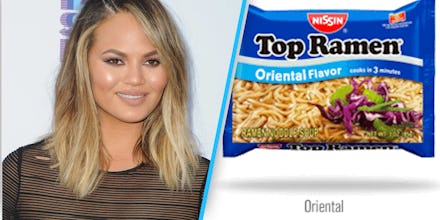Chrissy Teigen says she's not offended by the term "Oriental," but maybe she should be

The U.S. government is not permitted to use the term "Oriental" on federal documents, so why are companies allowed to use it on dressing packets?
On Monday night, model/cookbook author/Snapchat savant Chrissy Teigen took to Twitter to blast the poor dressing choices for her in-flight salad options — one of which was "Oriental." It was not the taste of the dressing she had a problem with, but the moniker itself. She said that she was "weirded out" by the name, and people quickly agreed.
Teigen — whose mother is Thai — then revealed that while she's not fond of the term, she's not offended by it either, chalking the usage up to ignorance. Unsurprisingly, a Twitter firestorm erupted. People inundated her feed with explanations as to why she was wrong with others angrily accusing her of misrepresenting Asians.
Teigen defended her stance, noting Oriental is inappropriate but not offensive. But is she right? After all, the label can be found on a number of foods from salad names to ramen flavors.
The term Oriental itself isn't inherently offensive — unlike slurs like "chink" and "slant eye," which are rooted in racism. At its most basic, it's a term based in geography and means of "the Orient," which Merriam Webster defines as "the countries of Eastern Asia."
But the word has some problematic nuances to it. Serena Dai, a writer and reporter for Eater, said she does find the word Oriental to be racist, but this is due to its "bad historical baggage," she shared in a Facebook message.
"It's a Eurocentric term from a time when people from Asia were seen as lesser human beings," she wrote. "As many people have noted, it's similar to using the word 'negro' for black Americans."
The term Oriental is strongly linked to the era of European colonialism where the Eastern part of the world as see as "the other," and therefore not equal, Al Jazeera noted.
Even in the U.S., the word has been used to divide people. "'Oriental' has been used to reinforce the idea that Asians were/are forever foreign and could never become American," Erika Lee, the director the Immigration History Research Center at the University of Minnesota told the Los Angeles Times. "These ideas helped to justify immigration exclusion, racial discrimination and violence, political disfranchisement and segregation."
'"Oriental' has been used to reinforce the idea that Asians were/are forever foreign and could never become American."
The term Oriental also conjures up "exotic" images of the Far East. The late literary critic and former Columbia professor Edward Said noted in his seminal text Orientalism that the term is "almost a European invention... a place of romance, exotic beings, haunting memories and landscapes, remarkable experiences." Essentially, it brings up exaggerated stereotypes like Fu Manchu and dragon ladies, writer Lucas Peterson noted in Lucky Peach.
Historical baggage aside, most people are uncomfortable with the word because it removes the identity of many people. "I don't think the use of Oriental is racist, but it's very general," Christine Yi, a popular food photographer, said. "I'm turned off by the term, but not outraged by it." She added there are many words out there that better describe the various cultures that make up Asia.
Chef Beverly Kim, a former Top Chef contestant, echoed a similar sentiment. "The word oriental contributes to the misconceived notion that Asians come from one big country," she said to Lucky Peach. "It minimizes the nuances in each Asian culture."
And while "Asian" is also a generalizing term — after all there are many countries that make up the continent of Asia — it's not as offensive as Oriental, Eater's Dai explained. The latter shouldn't be used because of its links to colonial history and exoticism, she added.
"I think using Oriental is an old way of thinking," Yi said. "People now are more aware of the different cultures that encompass 'Oriental' or Asian food. For people to still use the term, it's surprising, but it's probably because they don't know better."
Teigen tweeted a similar explanation, saying that she understands when people of older generations use the term. If anything, older Asians use the term themselves. "They say the word Oriental because that is the word they are used to," Yi concurred.
"That being said, I think there is a difference between calling a person and calling an object like a rug or food Oriental," Yi said. Calling people Oriental is unnecessary, she added, but Oriental can "refer to a style of things."
Still, Yi is shocked that commercial brands use the terminology front and center: Applebee's sells an Oriental Chicken Salad with Oriental dressing and ramen brand Nissin still sells packets of "Oriental" flavor ramen.
(Mic has reached out to both Nissin and Applebee's for comment, but neither responded at the time of publication.)
"It was probably an acceptable term at the time when [Nissin] first started marketing the ramen and they just don't want to change the name because people are used to it," Yi noted.
Offensive history aside, the phrase Oriental doesn't even denote a specific set of flavors. For Nissin, Oriental simply means a mix of soy and ginger, Lucky Peach noted. Wouldn't it be just as simple to dub these 99-cent soups as "soy and ginger flavored"? Same great flavor, less offensive.